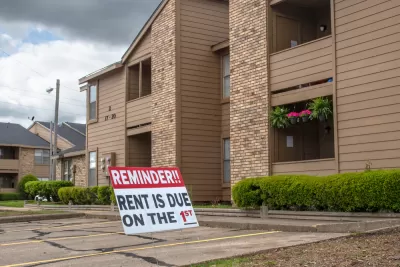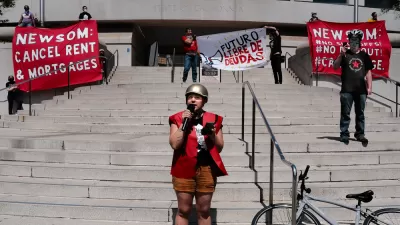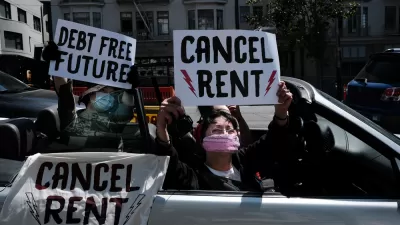The CDC's eviction moratorium will stay in place until at least June 30, 2021.

[Updated March 31, 2021] "The Centers for Disease Control and Prevention extended its federal moratorium on eviction for non-payment of rent until June 30," reports Anna Bahney.
"It marks the third time the deadline for lifting the ban has been pushed back. The CDC's order first went into effect in September and initially was set to expire at the end of 2020. But then in December, the protection was extended until January 31. As one of his first acts in office, President Joe Biden called on the CDC to extend the ban until March 31."
Bahney also notes that $50 billion in federal relief money has been approved for renters in the past two federal stimulus packages—the first while Donald Trump was still in office and the second the most recent American Rescue Plan Act.
Despite various eviction moratoria in place by the CDC and local and state governments around the country, many renters are still being evicted and renters are racking up debt that still threatens to destabilize the housing market and the larger economy. A Moody's Analytics report from January 2021 estimated that the nation's renters owed an estimated $57 billion in back rent.
The CDC has lost two recent court cases over the enforceability of the eviction moratorium, although both court decisions stopped short of repealing the moratorium. The U.S. Department of Justice is appealing both rulings.
FULL STORY: CDC extends eviction moratorium until June 30

Planetizen Federal Action Tracker
A weekly monitor of how Trump’s orders and actions are impacting planners and planning in America.

Chicago’s Ghost Rails
Just beneath the surface of the modern city lie the remnants of its expansive early 20th-century streetcar system.

San Antonio and Austin are Fusing Into one Massive Megaregion
The region spanning the two central Texas cities is growing fast, posing challenges for local infrastructure and water supplies.

Since Zion's Shuttles Went Electric “The Smog is Gone”
Visitors to Zion National Park can enjoy the canyon via the nation’s first fully electric park shuttle system.

Trump Distributing DOT Safety Funds at 1/10 Rate of Biden
Funds for Safe Streets and other transportation safety and equity programs are being held up by administrative reviews and conflicts with the Trump administration’s priorities.

German Cities Subsidize Taxis for Women Amid Wave of Violence
Free or low-cost taxi rides can help women navigate cities more safely, but critics say the programs don't address the root causes of violence against women.
Urban Design for Planners 1: Software Tools
This six-course series explores essential urban design concepts using open source software and equips planners with the tools they need to participate fully in the urban design process.
Planning for Universal Design
Learn the tools for implementing Universal Design in planning regulations.
planning NEXT
Appalachian Highlands Housing Partners
Mpact (founded as Rail~Volution)
City of Camden Redevelopment Agency
City of Astoria
City of Portland
City of Laramie





























